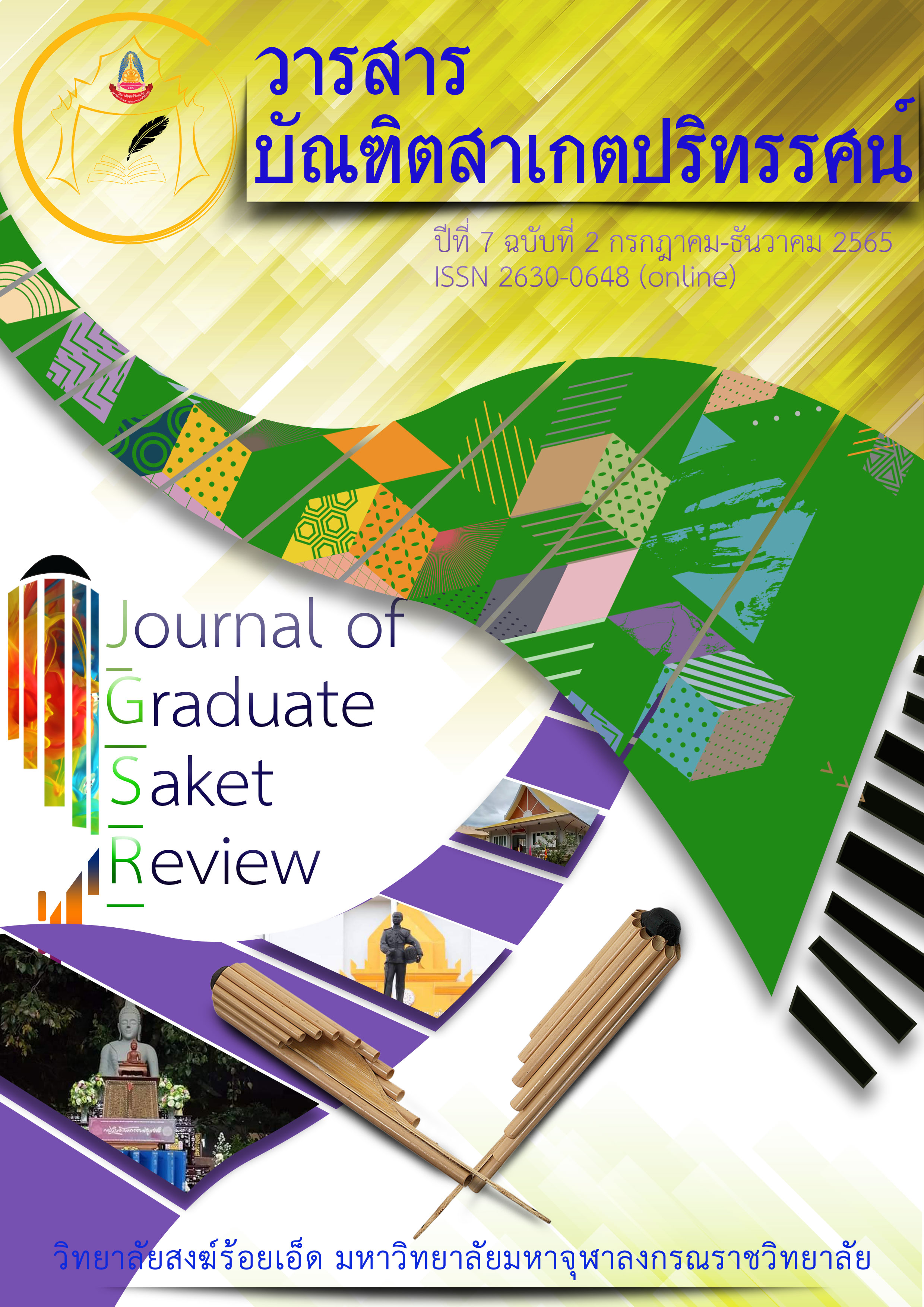การประยุกต์ใช้หลักพุทธธรรมในการจัดการโรงพยาบาลสนาม วิทยาลัยสงฆ์ร้อยเอ็ด อำเภอธวัชบุรี จังหวัดร้อยเอ็ด
Main Article Content
บทคัดย่อ
การศึกษาเรื่อง “การประยุกต์ใช้หลักพุทธธรรมในการจัดการโรงพยาบาลสนามวิทยาลัยสงฆ์ร้อยเอ็ด อำเภอธวัชบุรี จังหวัดร้อยเอ็ด” มีวัตถุประสงค์ ๓ ประการ 1) เพื่อศึกษาสภาพปัญหาการจัดการโรงพยาบาลสนามวิทยาลัยสงฆ์ร้อยเอ็ด อำเภอธวัชบุรี จังหวัดร้อยเอ็ด 2) เพื่อวิเคราะห์การประยุกต์ใช้หลักพุทธธรรมในการจัดการโรงพยาบาลสนามวิทยาลัยสงฆ์ร้อยเอ็ด อำเภอธวัชบุรี จังหวัดร้อยเอ็ด, และ 3) เพื่อเสนอการประยุกต์ใช้หลักพุทธธรรมในการจัดการโรงพยาบาลสนามวิทยาลัยสงฆ์ร้อยเอ็ด อำเภอธวัชบุรี จังหวัดร้อยเอ็ด
ผลการวิจัยพบว่า สังคหวัตถุ 4 สามารถประยุกต์ใช้ในโรงพยาบาลสนามได้ เป็นหลักปฏิบัติตนที่เป็นเครื่องยึดเหนี่ยวจิตใจผู้อื่นไว้ ซึ่งเป็นเรื่องใกล้ตัว คนเราทุกคนสามารถปฏิบัติได้โดยไม่ รู้ตัว และเป็นเหตุให้เรามีคนรักใคร่ มีสหาย มิตรบริวารมาก การเสียสละ การเอื้อเฟื้อเผื่อแผ่ ถือว่า เป็นการแบ่งปันช่วยเหลือกัน ทางพระพุทธศาสนาถือว่าการให้ทานเป็นการขจัดกิเลส ขจัดความโลภความตระหนี่ เป็นการชำระจิตใจให้ สะอาด ยกระดับจิตใจให้สูงขึ้น การพูดกัน คนเราอาศัยปาก ลิ้น และสมอง เป็นผู้บงการในการพูดเป็นเรื่องสำคัญของชีวิตมาก การวางตนได้เหมาะสม หรือความเสมอ ภาค ความเท่าเทียมกันกับคนอื่น เสมอต้นเสมอปลาย หมายถึง การวางตนได้เหมาะสม
ผลการเสนอการประยุกต์ใช้หลักพุทธธรรมพบว่า การให้ทานจัดเป็นบุญเป็นกุศล เป็นความดี อย่างหนึ่ง ทานมีความหมายเป็นทั้งนามธรรมและรูปธรรม ถ้าหมายถึงเจตนาที่ให้ก็เป็นนามธรรม ถ้าหมายถึงวัตถุที่ให้ก็เป็นรูปธรรม ผู้ที่มีวาจาน่ารัก มีวาจาสุภาพ ไพเราะ ทำให้เกิดไมตรีรักใคร่ มีผู้คนนับถือ ผู้ที่ประพฤติประโยชน์ช่วยปรับปรุงส่งเสริมในด้านคุณธรรมและจริยธรรม ทำตนเป็นประโยชน์ แก่ผู้อื่นและสังคม ผู้ที่วางตนสม่ำเสมอ ทำตัวให้เข้ากับคนอื่นได้ ให้ความเสมอภาค ปฏิบัติสม่ำเสมอ กันต่อคนทั้งหลาย ไม่เอาเปรียบ ร่วมสุข ร่วมทุกข์ ร่วมแก้ไขปัญหา เพื่อให้เกิดประโยชน์สุขร่วมกัน
ผลการวิจัยพบว่า สังคหวัตถุ 4 สามารถประยุกต์ใช้ในโรงพยาบาลสนามได้ เป็นหลักปฏิบัติตนที่เป็นเครื่องยึดเหนี่ยวจิตใจผู้อื่นไว้ ซึ่งเป็นเรื่องใกล้ตัว คนเราทุกคนสามารถปฏิบัติได้โดยไม่ รู้ตัว และเป็นเหตุให้เรามีคนรักใคร่ มีสหาย มิตรบริวารมาก การเสียสละ การเอื้อเฟื้อเผื่อแผ่ ถือว่า เป็นการแบ่งปันช่วยเหลือกัน ทางพระพุทธศาสนาถือว่าการให้ทานเป็นการขจัดกิเลส ขจัดความโลภความตระหนี่ เป็นการชำระจิตใจให้ สะอาด ยกระดับจิตใจให้สูงขึ้น การพูดกัน คนเราอาศัยปาก ลิ้น และสมอง เป็นผู้บงการในการพูดเป็นเรื่องสำคัญของชีวิตมาก การวางตนได้เหมาะสม หรือความเสมอ ภาค ความเท่าเทียมกันกับคนอื่น เสมอต้นเสมอปลาย หมายถึง การวางตนได้เหมาะสม
ผลการเสนอการประยุกต์ใช้หลักพุทธธรรมพบว่า การให้ทานจัดเป็นบุญเป็นกุศล เป็นความดี อย่างหนึ่ง ทานมีความหมายเป็นทั้งนามธรรมและรูปธรรม ถ้าหมายถึงเจตนาที่ให้ก็เป็นนามธรรม ถ้าหมายถึงวัตถุที่ให้ก็เป็นรูปธรรม ผู้ที่มีวาจาน่ารัก มีวาจาสุภาพ ไพเราะ ทำให้เกิดไมตรีรักใคร่ มีผู้คนนับถือ ผู้ที่ประพฤติประโยชน์ช่วยปรับปรุงส่งเสริมในด้านคุณธรรมและจริยธรรม ทำตนเป็นประโยชน์แก่ผู้อื่นและสังคม ผู้ที่วางตนสม่ำเสมอ ทำตัวให้เข้ากับคนอื่นได้ ให้ความเสมอภาค ปฏิบัติสม่ำเสมอกันต่อคนทั้งหลาย ไม่เอาเปรียบ ร่วมสุข ร่วมทุกข์ ร่วมแก้ไขปัญหา เพื่อให้เกิดประโยชน์สุขร่วมกัน
Article Details

อนุญาตภายใต้เงื่อนไข Creative Commons Attribution-NonCommercial-NoDerivatives 4.0 International License.
เนื้อหาและข้อมูลในบทความที่ลงตีพิมพ์ในวารสารบัณฑิตสาเกตปริทรรศน์ ถือเป็นข้อคิดเห็นและความรับผิดชอบของผู้เขียนบทความโดยตรงซึ่งกองบรรณาธิการวารสาร ไม่จำเป็นต้องเห็นด้วย หรือร่วมรับผิดชอบใด ๆบทความ ข้อมูล เนื้อหา รูปภาพ ฯลฯ ที่ได้รับการตีพิมพ์ในวารสารบัณฑิตสาเกตปริทรรศน์ ถือเป็นลิขสิทธิ์ของวารสารบัณฑิตสาเกตปริทรรศน์ หากบุคคลหรือหน่วยงานใดต้องการนำทั้งหมดหรือส่วนหนึ่งส่วนใดไปเผยแพร่ต่อหรือเพื่อกระทำการใด ๆ จะต้องได้รับอนุญาตเป็นลายลักอักษรจากวารสารบัณฑิตสาเกตปริทรรศน์ ก่อนเท่านั้น
เอกสารอ้างอิง
ภาษาไทย
กรมควบคุมโรค. กระทรวงสาธารณสุข. (2563). คู่มือการป้องกันและควบคุมโรคติดเชื้อไวรัสโคโรนา 2019 สำหรับประชาชน. กรุงเทพมหานคร: โรงพิมพ์ชุมนุมสหกรณ์การเกษตรแห่งประเทศไทย.
กรมควบคุมโรค กระทรวงสาธารณสุข. (2563). รายงานโรคติดเชื้อไวรัสโคโรนา 2019 (COVID-19). กรุงเทพมหานคร: โรงพิมพ์ชุมนุมสหกรณ์การเกษตรแห่งประเทศไทย.
สุมน อมรวิวัฒน์. (2542). การพัฒนาการเรียนรูตามแนวพุทธศาสตร์, โครงการกิตติเมธี สาขาวิชาศึกษาศาสตร์ : โรงพิมพ์มหาวิทยาลัยสุโขทัยธรรมาธิราช.
พันจ่าอากาศเอกบุญเพ็ง หงษา. (2548). การประยุกต์พุทธธรรมในหลักสูตรค่ายผู้นำเยาวชนต่อต้านยาเสพติดของกองทัพอากาศ. วิทยานิพนธ์หลักสูตรปริญญาพุทธศาสตรมหาบัณฑิต สาขาวิชาพระพุทธศาสนา บัณฑิตวิทยาลัย มหาวิทยาลัยมหาจุฬาลงกรณราชวิทยาลัย.
ศิวพร สัจจวัฒนา. (2555). การใช้หลักสังคหวัตถุ ๔ ในการให้บริการของ โรงพยาบาลส่งเสริมสุขภาพตำบลโนนฝรั่งตามการรับรู้ของประชาชน. วิทยานิพนธ์หลักสูตรปริญญาพุทธศาสตรมหาบัณฑิต สาขาวิชาพระพุทธศาสนา บัณฑิตวิทยาลัย มหาวิทยาลัยมหาจุฬาลงกรณราชวิทยาลัย.
สุทธิพงศ์ ปานเพ็ชร (2550). การประยุกต์หลักพุทธธรรมกับวิถีชีวิตชุมชน. รายงานการวิจัยอิสระ. มหาวิทยาลัยธุรกิจบัณฑิตย์.
ภาษาอังกฤษ
Boonpeng Hongsa. (2005). The application of Buddhism in the anti-drug youth leadership camp course of the Air Force. Master of Arts (Buddhist Studies) Graduate School Mahachulalongkornrajavidyalaya University.
Department of Disease Control. Ministry of Public Health. (2020). Coronavirus disease Prevention and control manual 2019 for the public. Bangkok: Thailand Agricultural Cooperative Assembly Printing House.
Department of Disease Control, Ministry of Public Health. (2020). Coronavirus disease 2019 (COVID-19) report. Bangkok: Thailand Agricultural Cooperative Assembly Printing House.
Sivaporn Sajjavattana (2555). A Sanígkhahawatthu 4 (Base of Sympathy) Application For The Service Of Healthy Hospital Of Nonpharung Subdistrict Based On People’s Views. Master of Arts (Buddhist Studies) Graduate School Mahachulalongkornrajavidyalaya University.
Sumon Amornvivat . (1999). Development of Learning According to Buddhism, Kittimedee Project. Department of Education : Sukhothai Thammathirat Open University Printing House.
Suthipong Panpetch. (2550). The application of Buddhist principles to the community way of life. Independent research report. Dhurakij Pundit University.


